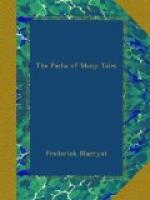“There’s obstinacy for you—women are nothing but opposition. If you wish them to be faithful, they try day and night to deceive you; give them their desires and tell them to be false, they will refuse. All was arranged so well, I should have cut off all their heads, and had a fresh wife every night until I found one who could tell stories; then I should have rose up and deferred her execution to the following day.”
Mustapha, who had been laughing in his sleeve at the strange idea of the pacha, was nevertheless not a little alarmed. He perceived that the mania had such complete possession, that, unless appeased, the results might prove unpleasant even to himself. It occurred to him, that a course might be pursued to gratify the pacha’s wishes, without proceeding to such violent measures. Waiting a little while until the colour, which had suffused the pacha’s face from anger and disappointment, had subsided, he addressed him:
“The plan of your sublime highness was such as was to be expected from the immensity of your wisdom; but hath not the prophet warned us, that the wisest of men are too often thwarted by the folly and obstinacy of the other sex. May your slave venture to observe, that many very fine stories were obtained by the caliph Haroun, and his vizier Mesrour, as they walked through the city in disguise. In all probability a similar result might be produced, if your highness were to take the same step, accompanied by the lowest of your slaves, Mustapha.”
“Very true,” replied the pacha, delighted at the prospect, “prepare two disguises, and we will set off in less than an hour—Inshallah, please the Lord, we have at last hit upon the right path.”
Mustapha, who was glad to direct the ideas of the pacha into a more harmless channel, procured the dresses of two merchants, (for such, he observed, were the usual habiliments put on by the caliph and his vizier in the Arabian Nights), and he was aware that his master’s vanity would be gratified at the idea of imitating so celebrated a personage.
It was dusk when they set off upon their adventures. Mustapha directed some slaves well armed to follow at a distance, in case their assistance might be required. The strict orders which had been issued on the accession of the new pacha (to prevent any riot or popular commotion), which were enforced by constant rounds of the soldiers on guard, occasioned the streets to be quite deserted.
For some time the pacha and Mustapha walked up one street and down another, without meeting with anything or any body that could administer to their wishes. The former, who had not lately been accustomed to pedestrian exercise, began to puff and show symptoms of weariness and disappointment, when at the corner of a street they fell in with two men, who were seated in conversation; and as they approached softly, one of them said to the other, “I tell you, Coja, that happy is the man who can always command a hard crust like this, which is now wearing away my teeth.”




